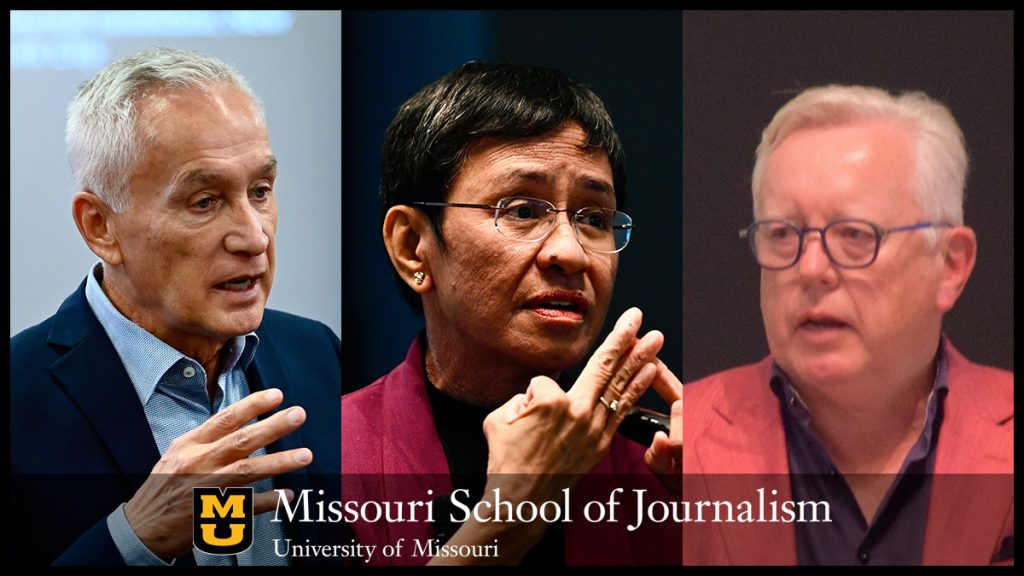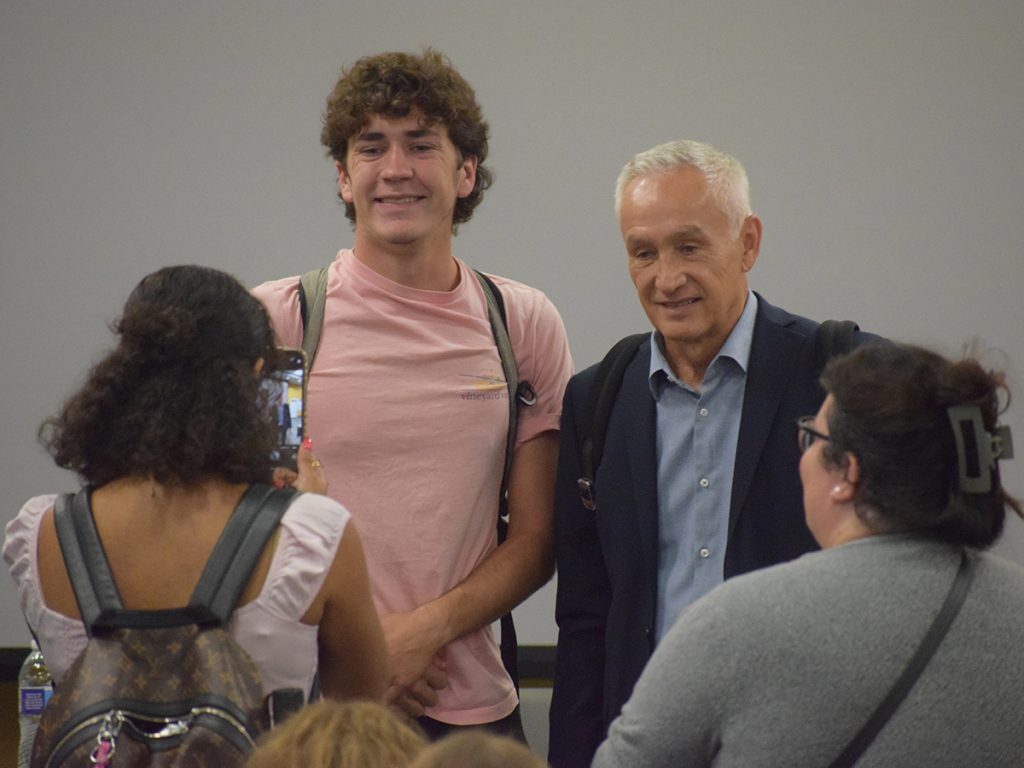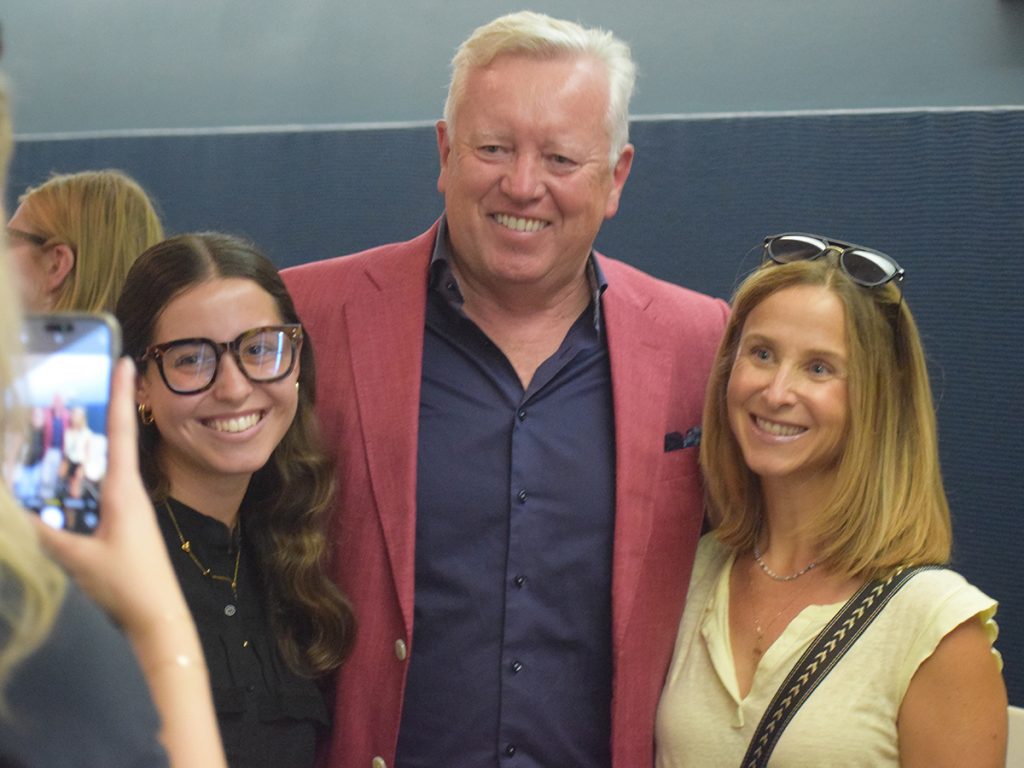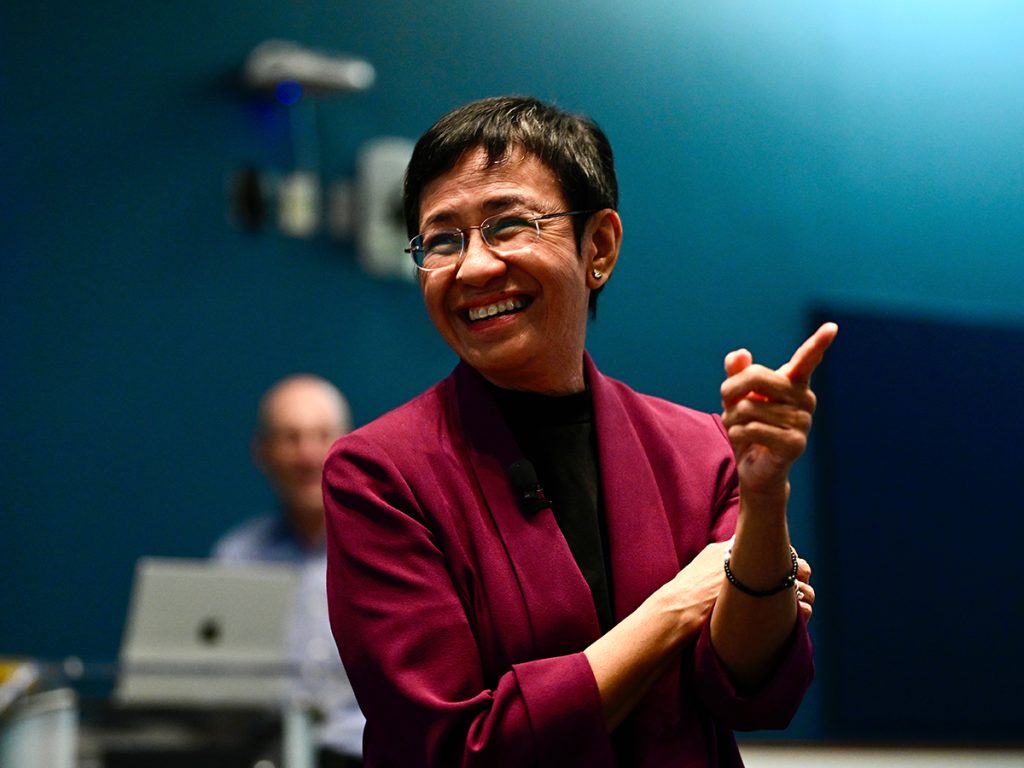Honor Medal master classes give students hard-won lessons drawn from legendary careers

COLUMBIA, Mo. (Oct. 2, 2025) — On Sept. 30, three towering figures in journalism and strategic communication gathered at the Missouri School of Journalism to present master classes to students.
Jorge Ramos, Maria Ressa and John Saunders would be honored with the 2025 Missouri Honor Medal for Distinguished Service later that evening, but the day was spent in dialogue with students about topics as various as the importance of preserving free speech, navigating the risks and opportunities presented by social media and remaining true to ethical principles.
“It was exciting to see students asking questions and engaging with these incredible storytellers,” said David Kurpius, dean of the School of Journalism. “Jorge, Maria and John put ethics at the forefront of everything they do, and the new generations following in their footsteps could not ask for better role models.”
The master classes took the form of insightful deep-dives into lessons learned from firsthand experience. Read on to learn more about each session.
Jorge Ramos
Question power and the power of questions

Ramos — prior to a nearly 40-year career as an anchor of flagship Univision news program Noticiero Univision — left Mexico as a young journalist after experiencing direct censorship. He went on to confront dictators like Venezuela’s Nicolás Maduro and Cuba’s Fidel Castro with tough questions, developing a reputation for fearless reporting in the face of intimidation.
Accordingly, his master class focused on how power dynamics can shape a reporter’s approach to a story, both in terms of the questions asked and the people the reporter chooses to interview.
“Do you think it’s the same thing to talk to a dictator and to a victim of that dictatorship?” Ramos asked the crowd in Ellis Auditorium. “It’s completely different. When you talk to someone who has a lot of power, you have to challenge them.”
Ramos introduced attendees to the principle of “contrapoder,” which translates from Spanish as “counter-power” or “on the other side of power.” For him, this means holding those in power to account regardless of political affiliation or personal interest.
While adhering to that code has seen him thrown to the ground when trying to question Castro on his opposition to democracy and detained in Venezuela after a forthright conversation with Maduro, it has made him a trusted voice among Spanish and English-speaking audiences in the U.S. — a fact Ramos underlined given the overall decline of public trust in journalism.
“Part of the mistrust in journalism is because we aren’t challenging those in power,” he said. “If you don’t want to do that, you’d better choose another profession. The only thing we have is our credibility.”
Like fellow medalist Ressa, he also stressed the importance of developing that credibility by adhering to ethical behavior as early as possible, even if the results are inconvenient. He recounted a conversation with his mother after quitting his first broadcast job in Mexico due to censorship, a move that effectively halted his prospects for a journalism career in the country and motivated his move to the U.S.
“In 1519, Hernán Cortés arrived in Mexico,” he said. “To ensure his soldiers wouldn’t leave, he burned the ships. So when I went home after I quit, I told my mom: I burned the ships.”
Maria Ressa
How to stand up to a dictator
Ressa, the co-founder and CEO of Filipino investigative news website Rappler, has also experienced what it’s like to be targeted for reporting the truth. After calling out corruption in the Rodrigo Duterte administration, she and her publication were hit with lawsuits, criminal charges and other forms of intimidation.
But emphasizing the importance of journalism’s role as a watchdog was only one part of Ressa’s session. A key focus was the growing dangers of profit-driven social media and search engines that mediate information, filtering it through lenses that distort or obscure facts to influence behavior and maximize monetization. But these practices don’t just benefit tech companies, she added. They also make it easier for false narratives that benefit the powerful to take hold.
“I think of the public information ecosystem like a river,” she said. “There is a factory dumping lies into this river, polluting it. The way we fix it is to stop the pollution before we fix what is happening downstream.”
In her view, stopping the pollution means returning to a shared reality in which people can agree on facts while allowing for differences in personal perspectives. Her solution is to embrace an alternative social media network based on the Matrix protocol, a framework free from data collection or echo chambers that limit open communication.
“It’s secure, it’s decentralized, it’s open source,” Ressa said. “It’s used by governments, military, intelligence, NATO. Why? Because they want data privacy. They want protection. So why are we not protected?”
For Rappler, the result is Rappler Communications, an app that allows people to chat about what interests them and engage with the news without worrying about data privacy, disinformation or the invisible influence of a profit-driven algorithm.
And while the app can help individuals and news organizations repair their relationship with a deeply fragmented and chaotic news ecosystem, there are also society-wide implications.
“If we lose the battle for information integrity, which is distinguishing between fact and fiction, we lose it all,” she said. “If we win it, then everything can follow. I do believe our humanity will win.”
John Saunders
If you don’t stand for something, you’ll fall for anything

As chairman of global communications consultancy FleishmanHillard, Saunders knows what it takes to climb to success in the industry, but he’ll also be the first to admit it’s not as complicated as it might seem.
His persistence and daring led him to win his then-small PR company a contract with Anheuser-Busch when the brewing company expanded into Ireland. But he’d possessed that same persistence and daring since his teenage years, when he started Ireland’s first soccer magazine and landed interviews with prominent figures in the sport. Then there was the time he convinced a helicopter company to surprise his newly married friend with a ride to the wedding reception in exchange for publicity. And don’t forget the time he orchestrated the appearance of a live elephant at a nine-year-old boy’s birthday.
“I still have that boyish enthusiasm for getting out there and making things happen,” Saunders said.
Though he did not minimize the importance of competence, he argued that openness to learning new skills and ways of thinking is just as important — especially for students being immersed in principles of ethics in communication.
“We’re stewards of trust,” he added, echoing Ramos. “Our ethical choices will define the credibility of our profession for years to come. Honesty, transparency and accountability matters more than ever.”
Students in attendance learned about a particular incident that brought the importance of ethics and reputation into focus. In 2009, in the wake of claims that famed musician Van Morrison had fathered a child with his tour manager, Saunders offered his services to Morrison and his family for free on the condition that Morrison would tell him the truth of matter. When Morrison denied paternity, Saunders went to bat on his behalf.
“The only issue was Van was not telling the truth,” Saunders said. “Now I was in the middle of the story, which is a very uncomfortable place to be. Eventually, I said to Van, ‘you’ve got to get me out of this. You may not care about my reputation, but I care. My reputation is all I have.’”
When Morrison refused, Saunders took him to court and ultimately restored the reputation for honesty that he had spent decades building.
The story was part of Saunders’ rebuttal of the narrative that strategic communication is inherently deceptive or dishonest, and it united him with Ramos and Ressa in his commitment to an ethical code that does not waver in the presence of a formidable influence.
“I’m not prepared to go knowingly and tell lies on behalf of anybody,” he said.
Updated: October 2, 2025
